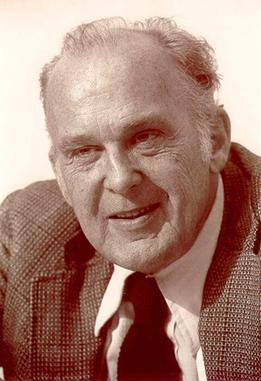
Patriotism is the feeling of love, devotion, and sense of attachment to one's country. This attachment can be a combination of many different feelings, language relating to one's own homeland, including ethnic, cultural, political or historical aspects. It encompasses a set of concepts closely related to nationalism, mostly civic nationalism and sometimes cultural nationalism.
Milford Howell Wolpoff is a paleoanthropologist and professor of anthropology at the University of Michigan and its museum of Anthropology. He is the leading proponent of the multiregional evolution hypothesis that explains the evolution of Homo sapiens as a consequence of evolutionary processes and gene flow across continents within a single species. Wolpoff authored the widely-used textbook Paleoanthropology, and co-authored Race and Human Evolution: A Fatal Attraction, which reviews the scientific evidence and conflicting theories about the interpretation of human evolution, and biological anthropology's relationship to views about race.
Evolutionary economics is part of mainstream economics as well as a heterodox school of economic thought that is inspired by evolutionary biology. Much like mainstream economics, it stresses complex interdependencies, competition, growth, structural change, and resource constraints but differs in the approaches which are used to analyze these phenomena. Some scholars prefer to call their evolutionary theory by a different names. Samuel Bowles named it "evolutionary social science" and Joachim Rennstich called it "evolutionary systems theory".
Arend d'Angremond Lijphart is a Dutch-American political scientist specializing in comparative politics, elections and voting systems, democratic institutions, and ethnicity and politics. He is Research Professor Emeritus of Political Science at the University of California, San Diego. He is influential for his work on consociational democracy and his contribution to the new Institutionalism in political science.
Sociocultural evolution, sociocultural evolutionism or social evolution are theories of sociobiology and cultural evolution that describe how societies and culture change over time. Whereas sociocultural development traces processes that tend to increase the complexity of a society or culture, sociocultural evolution also considers process that can lead to decreases in complexity (degeneration) or that can produce variation or proliferation without any seemingly significant changes in complexity (cladogenesis). Sociocultural evolution is "the process by which structural reorganization is affected through time, eventually producing a form or structure which is qualitatively different from the ancestral form".
Delbert Duane Thiessen is an American psychology professor emeritus whose research focused on evolutionary mechanisms of reproduction and social communication. Del Wolf Thiessen, Ph.D., Born: August 13, 1932 Died:February 9, 2022 Professor Emeritus Psychology at University of Texas at Austin, Texas.

Donald Thomas Campbell was an American social scientist. He is noted for his work in methodology. He coined the term evolutionary epistemology and developed a selectionist theory of human creativity. A Review of General Psychology survey, published in 2002, ranked Campbell as the 33rd most cited psychologist of the 20th century.

Randolph M. Nesse is an American physician, scientist and author who is notable for his role as a founder of the field of evolutionary medicine and evolutionary psychiatry. He is professor of life sciences and ASU Foundation Professor at Arizona State University, where he became the Founding Director of the Center for Evolution and Medicine in 2014. He was previously a professor of psychiatry, professor of psychology and research professor at the University of Michigan where he led the Evolution and Human Adaptation Program and helped to establish one of the world's first anxiety disorders clinics and conducted research on neuroendocrine responses to fear.

Evolutionary developmental psychology (EDP) is a research paradigm that applies the basic principles of evolution by natural selection, to understand the development of human behavior and cognition. It involves the study of both the genetic and environmental mechanisms that underlie the development of social and cognitive competencies, as well as the epigenetic processes that adapt these competencies to local conditions.

Evolutionary educational psychology is the study of the relation between inherent folk knowledge and abilities and accompanying inferential and attributional biases as these influence academic learning in evolutionarily novel cultural contexts, such as schools and the industrial workplace. The fundamental premises and principles of this discipline are presented below.
Azar Gat is a researcher and author on military history, military strategy and war and peace in general. Along with Steven Pinker and others, Gat argues that war is in decline in today's world.
Robert Melson is professor emeritus of political science and a member of the Jewish studies program at Purdue University, in Indiana, United States. From 2003 to 2005, he was the President of the International Association of Genocide Scholars (IAGS). In 2006 and 2007, he was the Cathy Cohen-Lasry Distinguished Professor in the Strassler Family Center for Holocaust and Genocide Studies at Clark University, Worcester, Massachusetts.

Jaak Panksepp was an Estonian-American neuroscientist and psychobiologist who coined the term "affective neuroscience", the name for the field that studies the neural mechanisms of emotion. He was the Baily Endowed Chair of Animal Well-Being Science for the Department of Veterinary and Comparative Anatomy, Pharmacology, and Physiology at Washington State University's College of Veterinary Medicine, and Emeritus Professor of the Department of Psychology at Bowling Green State University. He was known in the popular press for his research on laughter in non-human animals.

Universal Darwinism, also known as generalized Darwinism, universal selection theory, or Darwinian metaphysics, is a variety of approaches that extend the theory of Darwinism beyond its original domain of biological evolution on Earth. Universal Darwinism aims to formulate a generalized version of the mechanisms of variation, selection and heredity proposed by Charles Darwin, so that they can apply to explain evolution in a wide variety of other domains, including psychology, linguistics, economics, culture, medicine, computer science, and physics.
Dominic D. P. Johnson is an Alistair Buchan Professor of International Relations at St Antony's College, Oxford.
George J. Armelagos was an American anthropologist, and Goodrich C. White Professor of Anthropology at Emory University in Atlanta, Georgia. Armelagos significantly impacted the field of physical anthropology and biological anthropology. His work has provided invaluable contributions to the theoretical and methodological understanding human disease, diet and human variation within an evolutionary context. Relevant topics include epidemiology, paleopathology, paleodemography, bioarchaeology, evolutionary medicine, and the social interpretations of race, among others.

Elizabeth Caroline Crosby was an American neuroanatomist. Crosby received the National Medal of Science from President Jimmy Carter in 1979 "for outstanding contributions to comparative and human neuroanatomy and for the synthesis and transmission of knowledge of the entire nervous system of the vertebrate phylum." Her "careful descriptions" of vertebrate brains - especially reptiles - helped "outline evolutionary history" and her work as a clinical diagnostic assistant to neurosurgeons resulted in "the correlation of anatomy and surgery."
Scott Frederick Gilbert is an American evolutionary developmental biologist and historian of biology.

Allan Combs is an American consciousness theorist who studies the complexity of the mind. Biologist, theoretical neuroscientist and philosopher Walter Jackson Freeman III, wrote of Combs: [His work] "transcends the fading antimony of The Two Cultures and demonstrates the unity of human knowledge in his synthesis of modern brain dynamics with a broad sweep of history and mythology. It is a stunning achievement."







